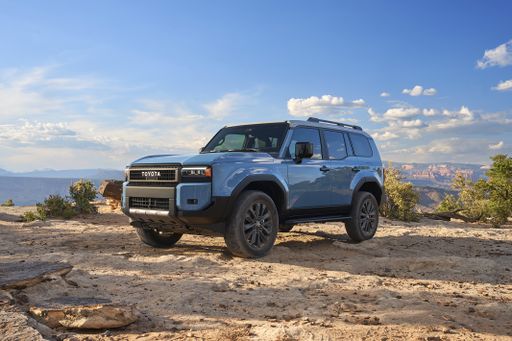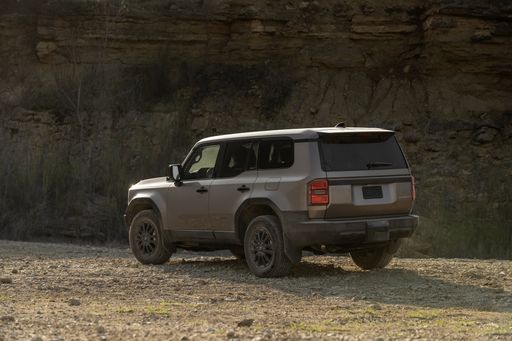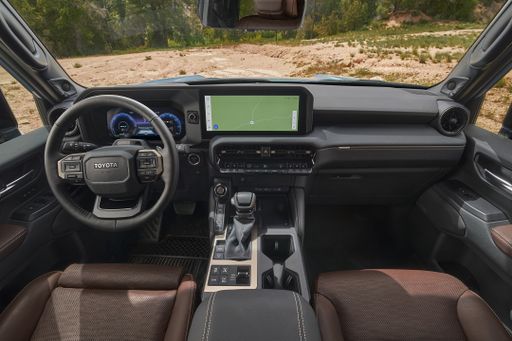Toyota Land Cruiser vs Porsche Cayman - Differences and prices compared
Costs and Efficiency:
Price and efficiency are often the first things buyers look at. Here it becomes clear which model has the long-term edge – whether at the pump, the plug, or in purchase price.
Toyota Land Cruiser has a clearly advantage in terms of price – it starts at 70700 £, while the Porsche Cayman costs 136000 £. That’s a price difference of around 65323 £.
Fuel consumption also shows a difference: Toyota Land Cruiser manages with 10.60 L and is therefore distinct more efficient than the Porsche Cayman with 13 L. The difference is about 2.40 L per 100 km.
Engine and Performance:
Under the bonnet, it becomes clear which model is tuned for sportiness and which one takes the lead when you hit the accelerator.
When it comes to engine power, the Porsche Cayman has a clearly edge – offering 500 HP compared to 205 HP. That’s roughly 295 HP more horsepower.
In acceleration from 0 to 100 km/h, the Porsche Cayman is significantly quicker – completing the sprint in 3.40 s, while the Toyota Land Cruiser takes 12.30 s. That’s about 8.90 s faster.
In terms of top speed, the Porsche Cayman performs decisively better – reaching 315 km/h, while the Toyota Land Cruiser tops out at 170 km/h. The difference is around 145 km/h.
There’s also a difference in torque: Toyota Land Cruiser pulls barely noticeable stronger with 500 Nm compared to 450 Nm. That’s about 50 Nm difference.
Space and Everyday Use:
Beyond pure performance, interior space and usability matter most in daily life. This is where you see which car is more practical and versatile.
Seats: Toyota Land Cruiser offers significantly more seating capacity – 7 vs 2.
In curb weight, Porsche Cayman is clearly lighter – 1490 kg compared to 2610 kg. The difference is around 1120 kg.
In terms of boot space, the Toyota Land Cruiser offers convincingly more room – 742 L compared to 184 L. That’s a difference of about 558 L.
In maximum load capacity, the Toyota Land Cruiser performs convincingly better – up to 1895 L, which is about 1623 L more than the Porsche Cayman.
When it comes to payload, Toyota Land Cruiser convincingly takes the win – 540 kg compared to 281 kg. That’s a difference of about 259 kg.
Who wins the race?
The Porsche Cayman proves to be dominates this comparison and therefore becomes our DriveDuel Champion!
Porsche Cayman is the better all-rounder in this comparison.

Porsche Cayman
Costs and Consumption
View detailed analysis
Engine and Performance
View detailed analysis
Dimensions and Body
View detailed analysis
Toyota Land Cruiser
The Toyota Land Cruiser is the kind of SUV that makes you feel ready to abandon the map and take the long way home, with legendary go-anywhere capability wrapped in reassuringly solid build quality. Inside it's surprisingly comfortable and grown-up — a practical luxury for buyers who want reliability and presence rather than fleeting flash.
details @ Toyota Motor Corporation
@ Toyota Motor Corporation
 @ Toyota Motor Corporation
@ Toyota Motor Corporation
 @ Toyota Motor Corporation
@ Toyota Motor Corporation
Porsche Cayman
The Porsche Cayman stands out as a quintessential sports car, blending sleek design with dynamic handling. Its mid-engine layout provides an excellent balance and sharp agility that driving enthusiasts crave. Inside, the Cayman offers a refined and driver-focused interior, ensuring that every journey is an exhilarating experience.
details
 @ Toyota Motor Corporation
@ Toyota Motor Corporation
|
|
|
|
|
Costs and Consumption |
|
|---|---|
|
Price
70700 - 79300 £
|
Price
136000 £
|
|
Consumption L/100km
10.6 - 10.8 L
|
Consumption L/100km
13 L
|
|
Consumption kWh/100km
-
|
Consumption kWh/100km
-
|
|
Electric Range
-
|
Electric Range
-
|
|
Battery Capacity
-
|
Battery Capacity
-
|
|
co2
278 - 284 g/km
|
co2
295 g/km
|
|
Fuel tank capacity
80 L
|
Fuel tank capacity
54 L
|
Dimensions and Body |
|
|---|---|
|
Body Type
Off-Roader
|
Body Type
Coupe
|
|
Seats
5 - 7
|
Seats
2
|
|
Doors
5
|
Doors
2
|
|
Curb weight
2610 kg
|
Curb weight
1490 kg
|
|
Trunk capacity
143 - 742 L
|
Trunk capacity
184 L
|
|
Length
4925 mm
|
Length
4456 mm
|
|
Width
1980 mm
|
Width
1822 mm
|
|
Height
1935 mm
|
Height
1267 mm
|
|
Max trunk capacity
1829 - 1895 L
|
Max trunk capacity
272 L
|
|
Payload
540 kg
|
Payload
281 kg
|
Engine and Performance |
|
|---|---|
|
Engine Type
Diesel
|
Engine Type
Petrol
|
|
Transmission
Automatic
|
Transmission
Automatic
|
|
Transmission Detail
Automatic Gearbox
|
Transmission Detail
Dual-Clutch Automatic
|
|
Drive Type
All-Wheel Drive
|
Drive Type
Rear-Wheel Drive
|
|
Power HP
205 HP
|
Power HP
500 HP
|
|
Acceleration 0-100km/h
12.30 s
|
Acceleration 0-100km/h
3.40 s
|
|
Max Speed
170 km/h
|
Max Speed
315 km/h
|
|
Torque
500 Nm
|
Torque
450 Nm
|
|
Number of Cylinders
4
|
Number of Cylinders
6
|
|
Power kW
151 kW
|
Power kW
368 kW
|
|
Engine capacity
2755 cm3
|
Engine capacity
3996 cm3
|
General |
|
|---|---|
|
Model Year
2025
|
Model Year
2021
|
|
CO2 Efficiency Class
G
|
CO2 Efficiency Class
G
|
|
Brand
Toyota
|
Brand
Porsche
|
What drivetrain options does the Toyota Land Cruiser have?
The Toyota Land Cruiser is offered with All-Wheel Drive.
The prices and data displayed are estimates based on German list prices and may vary by country. This information is not legally binding.
